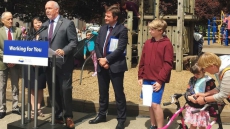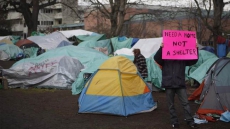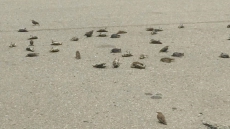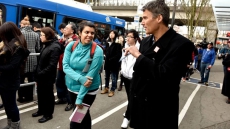VICTORIA — The leaders of British Columbia's two main parties square off Thursday in a debate on electoral reform that experts say arrives after decades of electoral dysfunction that produced lopsided victories and made losers out of popular-vote winners.
Voters need to mail in their ballots by the Nov. 30 deadline to either support moving to a form of proportional representation for the next election or to keep the current first-past-the-post system. A majority of 50 per cent plus one is needed to change the system.
Premier John Horgan will debate in favour of reform, while Opposition Liberal Leader Andrew Wilkinson will make the case for keeping the current system. Green Leader Andrew Weaver, who supports proportional representation, is not participating in the debate.
Prof. Richard Johnston, an electoral system expert at the University of B.C., said in order to understand electoral reform in the province, it's best to look back decades at baffling election results, political characters and shifting allegiances to the idea of changing the system.
The referendum is B.C.'s third such question on electoral reform, with previous votes in 2005 and 2009. Both ended in defeat. Horgan said last December in a year-end interview that he believed the third vote would be the province's last.
Tonight's the night! Tune in at 7PM on CBC BC & Global BC (& streaming live on their Facebook pages), as Premier John Horgan debates BC Liberal Leader Andrew Wilkinson on #prorep & making every vote count. #pr4bc #prdebate pic.twitter.com/GD186K2OEs
— BC NDP (@bcndp) November 8, 2018
Johnston said current voter reform history dates back to B.C.'s 1991 election, where Mike Harcourt's New Democrats won a majority that spelled the end of Social Credit rule. But more surprising was the rise of the Liberals under former leader Gordon Wilson, who shot from no seats to Official Opposition status, signalling a political shift to the centre from the traditional right-left parties.
"That surge to the Liberals was as clear a centrist signal as you could ever imagine an electorate sending," said Johnston.
Then came the 1996 election, where former Liberal leader Gordon Campbell received more votes but lost to the NDP's Glen Clark. Campbell promised to pursue electoral reform after his defeat, Johnston said.
But in the subsequent 2001 election, Campbell's Liberals decimated Ujjal Dosanjh's NDP, winning 77 of 79 seats and capturing almost 58 per cent of the popular vote. Campbell, "much to his credit," went ahead with the 2005 reform referendum, which was tied to the provincial election campaign, Johnston said.
The turmoil of those years provides the backdrop for the current vote, he said.
REMINDER: The #PRDebate featuring @Wilkinson4BC & @jjhorgan Will be broadcast live tonight at 7PM, Pre-debate coverage begins at 6:30PM.
— BC Liberal Caucus (@BCLiberalCaucus) November 8, 2018
📺 Watch: @GlobalBC @cbcnewsbc
📻 Listen: @CKNW
💻 Online: https://t.co/7z7L0fbaP6, https://t.co/OlcJ9pACFd pic.twitter.com/NpBge8KB17
"There we were from 1991 to 2005, one of the most dysfunctional electoral operations in the world," Johnston said. "Everything that could go wrong under first-past-the-post kind of did."
Former Green leader Stuart Parker, also a former member of the NDP, said he agrees B.C.'s current push for electoral reform dates back to the 1991 election.
He said he is an ardent supporter of proportional representation but is dismayed by what he sees during this campaign.
"When the electoral reform movement is successful, it is multi-partisan, populist and principled," Parker said. "I would say when the movement is unsuccessful, as I'm pretty damn sure it is about to be, it is because it is partisan and self-serving in character, or worse."
Parker said he senses voters are not convinced the New Democrats are 100 per cent behind electoral reform and he's bracing for another defeat.
"I'm a die-hard proportional representation supporter, which is why watching this referendum is absolutely excruciating," Parker said.
Johnston said he also believes the NDP is not "fully on board" with proportional representation because some party members long for majority governments even as history shows the New Democrats only win about one in five elections in B.C. under the current system.
The Liberals also stand better chances of winning future majority governments under the current system, he said.
He said both the Liberals and NDP are using this referendum to support positions that give them the best shot at electoral success, while publicly declaring their allegiance to democracy.
"I don't fault them for that, just stop adjusting your halo is all I ask," Johnston quipped.
Horgan said he supports proportional representation because political parties that receive 40 per cent of the votes should not get 100 per cent of political power. He cited the 1996 election where the NDP's Clark won with 39 per cent of the vote despite Campbell's Liberals getting almost 42 per cent.
"That's the very reason we need to change the system," he said.
Johnston said the debate offers Horgan the opportunity to tell voters directly what electoral reform will look like for the NDP.
"If you are asking for some kind of assurance about the future, you can be assured that under proportional representation no NDP government will have a majority by itself," he said. "It will always have to share power. It will always be with someone quite moderate."
Wilkinson, noting it was the Liberals who first brought forward electoral reform under Campbell, said the current referendum is too politically driven by the NDP and it's taking power away from voters.
"We don't see the merits of shifting the essence of our democracy, basically at the whim of the NDP," he said. "The right to vote belongs to citizens and should not be manipulated by political parties."




